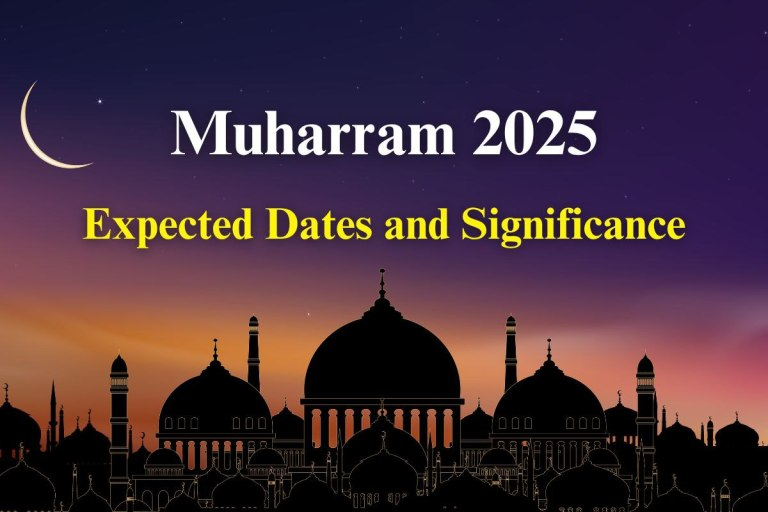1st Muharram 2025: Islamic New Year & Martyrdom of Caliph Umar al-Farooq (RA)

The 1st Muharram 2025 marks the beginning of the Islamic New Year (1447 AH), a time of deep spiritual reflection, renewal, and remembrance for Muslims worldwide. Unlike the Gregorian New Year, which is often celebrated with festivities, the Islamic New Year is observed with solemnity, prayer, and fasting.
This sacred month also holds immense historical significance as it marks the martyrdom of the second Caliph of Islam, Sayyiduna Umar ibn al-Khattab (RA), who was assassinated on 1st Muharram, 24 AH.
This article explores the date, history, significance, and practices associated with Muharram 2025, along with the life and legacy of Umar al-Farooq (RA).
Read More: The First Kalima Tayyab

When Is 1st Muharram 2025?
The 1st of Muharram 2025 is expected to begin on Thursday, 26th June 2025 (subject to moon sighting). However, in countries like Pakistan, India, and Bangladesh, the new Islamic year may start on Friday, 27th June 2025, depending on local moon sightings.
Key Dates in Muharram 2025:
- 1st Muharram 1447 AH: 26th June 2025 (Arab countries) / 27th June 2025 (South Asia)
- Day of Ashura (10th Muharram): 5th July 2025
The Islamic calendar is lunar-based, meaning each month begins with the sighting of the new moon. As a result, dates may vary slightly across different regions.
The Significance of 1st Muharram 2025 in Islam
Muharram is the first month of the Islamic Hijri calendar and is one of the four sacred months mentioned in the Quran:
“Indeed, the number of months with Allah is twelve [lunar] months in the register of Allah [from] the day He created the heavens and the earth; of these, four are sacred.” (Quran 9:36)
The four sacred months are:
- Muharram
- Rajab
- Dhul-Qa’dah
- Dhul-Hijjah

Historical Events of Muharram
- Hijrah (Migration) of Prophet Muhammad (PBUH):
- The Islamic calendar was established during the reign of Caliph Umar ibn al-Khattab (RA), marking the migration (Hijrah) of the Prophet (PBUH) from Makkah to Madinah in 622 CE.
- This event symbolizes the beginning of the first Islamic state and the triumph of faith over oppression.
- Martyrdom of Imam Hussain (RA) on Ashura (10th Muharram):
- The 10th of Muharram (Ashura) is a day of mourning for Muslims, particularly Shia Muslims, commemorating the martyrdom of Imam Hussain (RA) and his companions in the Battle of Karbala (680 CE).
- Sunni Muslims also observe fasting on Ashura, following the Sunnah of the Prophet (PBUH).
- Martyrdom of Umar al-Farooq (RA) on 1st Muharram:
- The 1st of Muharram also marks the martyrdom of Caliph Umar ibn al-Khattab (RA), who was stabbed by a Persian slave while leading Fajr prayers.
- He passed away three days later and was buried beside the Prophet Muhammad (PBUH) and Abu Bakr al-Siddiq (RA).
The Life and Legacy of Umar al-Farooq (RA)
The Ascetic Caliph: A Model of Humility and Justice
Despite ruling over a vast and powerful empire, Umar ibn al-Khattab (RA) lived an extraordinarily simple life, rejecting luxury and extravagance.
1. His Simple Lifestyle
- Clothing: He wore patched garments, often with 12 or more repairs, and refused new clothes.
- Food: He ate dry bread, olives, and simple meals, saying:“Destruction is for the one whose stomach leads him to Hell.”
- Travel: He journeyed without royal pomp, even walking barefoot at times.
2. His Justice and Leadership
- Established the Islamic Hijri calendar.
- Expanded Muslim territories with fairness, ensuring rights for non-Muslims.
- Personally inspected his people at night to ensure their welfare.
3. His Martyrdom (1st Muharram, 24 AH)
- Stabbed by Abu Lu’luah, a Persian slave, during Fajr prayer.
- Died after three days and was buried beside the Prophet (PBUH).
- His last words:“Put me next to my two companions (the Prophet and Abu Bakr).”
How Is 1st Muharram 2025 Observed?
Muslims observe Muharram in different ways, depending on their traditions and school of thought.
1. Fasting on Ashura (10th Muharram)
- The Prophet Muhammad (PBUH) fasted on the 10th of Muharram and encouraged Muslims to do the same.
- It is Sunnah to fast on the 9th and 10th (or 10th and 11th) of Muharram to distinguish from Jewish traditions.
2. Mourning and Majlis (Shia Observance)
- Shia Muslims hold mourning gatherings (Majlis) where the tragedy of Karbala is recounted.
- Processions, recitations of elegies (Nohas), and acts of charity are common.
3. Increased Worship and Charity
- Muslims engage in extra prayers (Nafl), Quran recitation, and charitable deeds.
- Since Muharram is a sacred month, good deeds are believed to carry greater rewards.
4. Avoiding Sin and Conflict
- Warfare and violence are forbidden during sacred months, so Muslims focus on peace, repentance, and self-improvement.
Common Misconceptions About 1st Muharram 2025
- Muharram is an “Unlucky” Month:
- False. It is a sacred and blessed month, not a time of bad omen.
- Weddings Are Forbidden in Muharram:
- There is no Islamic prohibition on marriages in Muharram.
- Ashura Fasting is Only for Shia Muslims:
- Sunni Muslims also fast on Ashura following the Prophet’s (PBUH) Sunnah.
- Myths About Special Meals or Kohl Application:
- Some believe applying kohl (surma) or cooking special dishes brings blessings, but these practices lack authentic Islamic basis.
Conclusion
The 1st of Muharram 2025 is not just the start of a new Islamic year but a time for spiritual renewal, remembrance, and devotion. It also marks the martyrdom of Umar al-Farooq (RA), a leader whose justice and humility remain unmatched.
May the new Hijri year bring peace, blessings, and spiritual growth to all. Ameen.

Read More: 1st Muharram 2025
FAQs About 1st Muharram 2025
1. When is 1st Muharram 2025?
- Expected on 26th June 2025 (Arab world) or 27th June 2025 (South Asia).
2. Why is 1st Muharram 2025 significant?
- It marks the Islamic New Year, the Hijrah, and includes Ashura, a day of fasting and remembrance.
3. Is 1st Muharram 2025 a public holiday?
- In many Muslim-majority countries, 1st Muharram is a public holiday.
4. How do Sunni and Shia Muslims observe 1st Muharram 2025 differently?
- Sunni Muslims focus on fasting and worship.
- Shia Muslims emphasize mourning Imam Hussain’s martyrdom.
5. Can I fast only on the 10th of Muharram?
- Yes, but it is better to fast on the 9th and 10th to differentiate from Jewish customs.
6. What should I avoid during Muharram?
- Avoid sin, conflict, and unnecessary celebrations. Focus on worship and reflection.









